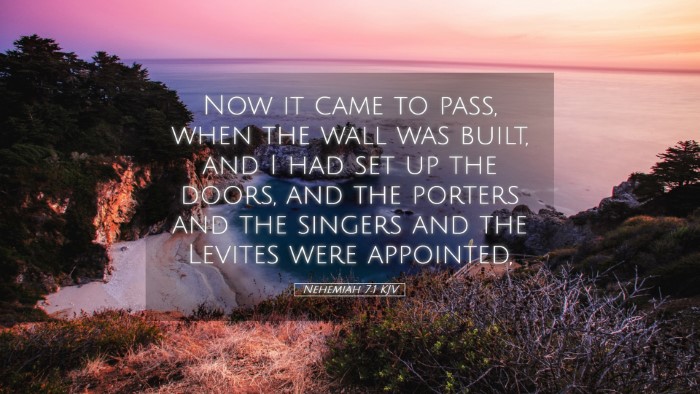Commentary on Nehemiah 7:1
Nehemiah 7:1 marks the transition from the rebuilding of the wall to the re-establishment of worship and community in Jerusalem. This verse states:
"Now it came to pass, when the wall was built, and I had set up the doors, and the porters and the singers and the Levites were appointed,"
Contextual Significance
This verse opens up a significant moment in the narrative of Nehemiah, indicating the successful completion of a crucial part of the restoration of Jerusalem after the Babylonian exile. It emphasizes both the physical and spiritual dimensions of rebuilding.
Completion of the Wall
The wall symbolizes protection and security for the people of Israel. Matthew Henry notes that the completion of the wall under Nehemiah's leadership was not just a physical structure but a restoration of the city’s dignity and safety.
The Importance of the Doors
Nehemiah's attention to the setting up of the doors emphasizes the need for proper access and the protection of the city. Albert Barnes comments that doors signify both entry and exit, indicating the community's need to ensure safety from potential threats while permitting sacred activities to occur within.
Roles of Porters, Singers, and Levites
In this verse, Nehemiah declares the appointment of key roles that were essential for the proper functioning of the temple and city. Adam Clarke highlights the following:
- Porters: They played a vital role in guarding the entrance to the temple, symbolizing the need for spiritual vigilance.
- Singers: Their presence is a reminder of the centrality of worship and praise in the life of the community, which was to be a constant aspect of life in restored Jerusalem.
- Levites: They were responsible for the religious duties, indicating Nehemiah’s commitment to reinstate the worship of Yahweh among the people.
Theological Reflections
Nehemiah 7:1 teaches vital lessons about community, leadership, and worship:
Community Restoration
The rebuilding effort initiated by Nehemiah wasn’t limited to physical structures; it extended to restoring the community’s identity and spiritual practice. Matthew Henry emphasizes how necessary it is for communities to reestablish worship practices to ensure their viability and purity before God.
Leadership and Organization
Nehemiah’s leadership style involved careful planning and the delegation of responsibilities. Albert Barnes points out that effective leadership in the church requires appointing capable individuals in their appropriate roles to foster spiritual growth and security.
Worship as Central
Worship is depicted as central to the life of the renewed community. Adam Clarke notes that the roles established in this verse reflect God's intention for His people to live in continuous worship and connection with Him. The singers and Levites symbolize a community dedicated to spiritual outpouring and commitment to God’s service.
Practical Applications
For pastors and church leaders, Nehemiah 7:1 serves as a model for community building and the importance of establishing roles within the church.
Importance of Structure in Church
Structure in church governance and worship is crucial. Just as Nehemiah appointed porters, singers, and Levites, it is essential for modern churches to establish clear roles to promote order, worship, and security in their communities.
Cultivating a Culture of Worship
Encouraging a culture of worship can lead to a spiritually vibrant church. Worship should not be an afterthought but should form the foundation of church life, as demonstrated in Nehemiah’s endeavors.
Visionary Leadership
Leaders today can learn from Nehemiah’s approach; it is vital to have a clear vision and to take concrete steps towards achieving it, ensuring that all aspects of church life are harmoniously integrated.
Conclusion
Nehemiah 7:1 serves not only as a historical account but as a theological and practical guide for building communities of faith. The appointed roles indicate that spiritual and organizational order is critical for the sustaining of a healthy community. Thus, this verse invites all believers to reflect on their participation in the body of Christ and the importance of worship, order, and security in their spiritual walks.


